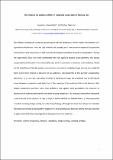Files in this item
No evidence for audience effects in reciprocal cooperation of Norway rats
Item metadata
| dc.contributor.author | Schweinfurth, Manon Karin | |
| dc.contributor.author | Taborsky, Michael | |
| dc.date.accessioned | 2019-04-16T12:30:01Z | |
| dc.date.available | 2019-04-16T12:30:01Z | |
| dc.date.issued | 2016-06 | |
| dc.identifier | 258579425 | |
| dc.identifier | afc41270-461c-429b-9c5c-05fbfb7b2a41 | |
| dc.identifier | 84964043845 | |
| dc.identifier.citation | Schweinfurth , M K & Taborsky , M 2016 , ' No evidence for audience effects in reciprocal cooperation of Norway rats ' , Ethology , vol. 122 , no. 6 , pp. 513-521 . https://doi.org/10.1111/eth.12499 | en |
| dc.identifier.issn | 0179-1613 | |
| dc.identifier.other | ORCID: /0000-0003-2066-7892/work/56639215 | |
| dc.identifier.uri | https://hdl.handle.net/10023/17533 | |
| dc.description | Funding was provided by SNF grants 310030B_138660 and 31003A_156152 to Michael Taborsky. | en |
| dc.description.abstract | Norway rats (Rattus norvegicus) cooperate according to indirect reciprocity, which implies the involvement of a reputation mechanism. Here, we test whether the rats employ such mechanism in repeated cooperative interactions. Focal subjects were first trained individually to pull food towards a social partner. During the experiment, the focal rats were confronted with two types of trained social partners: one always cooperated and the other one always defected, either in the presence or in the absence of an audience. Based on the hypotheses that the rats possess a reputation mechanism involving image scoring, we predicted them to be more helpful in the presence of an audience, independently of the partner's cooperative behaviour. If, in contrast, reputation involved a standing strategy, we predicted the rats to distinguish more between cooperators and defectors in the presence of an audience than in its absence. The rats helped cooperative partners more than defectors, but against both predictions the presence or absence of an audience did not influence their helping propensity. This indicates that either reputation is not included in the decision of rats to help an individual that has helped others, or that reputation is neither involving image scoring nor a standing strategy. Although the rats have been shown to modulate their decision to help a social partner based on its helpful behaviour towards others, they do not seem to adjust their behaviour strategically to the presence of an audience. | |
| dc.format.extent | 993320 | |
| dc.language.iso | eng | |
| dc.relation.ispartof | Ethology | en |
| dc.subject | Altruism | en |
| dc.subject | Image scoring | en |
| dc.subject | Indirect reciprocity | en |
| dc.subject | Reputation | en |
| dc.subject | Standing strategy | en |
| dc.subject | BF Psychology | en |
| dc.subject | NDAS | en |
| dc.subject.lcc | BF | en |
| dc.title | No evidence for audience effects in reciprocal cooperation of Norway rats | en |
| dc.type | Journal article | en |
| dc.contributor.institution | University of St Andrews.School of Psychology and Neuroscience | en |
| dc.identifier.doi | 10.1111/eth.12499 | |
| dc.description.status | Peer reviewed | en |
| dc.date.embargoedUntil | 2017-04-21 |
This item appears in the following Collection(s)
Items in the St Andrews Research Repository are protected by copyright, with all rights reserved, unless otherwise indicated.

